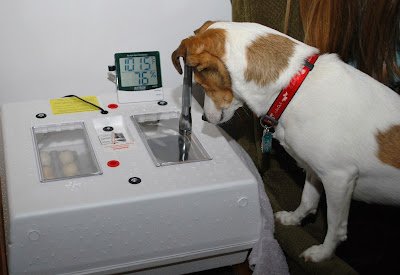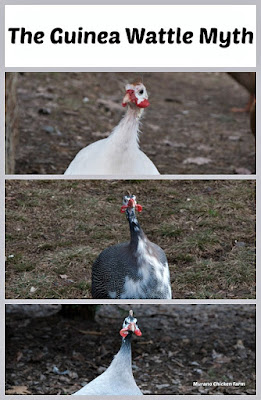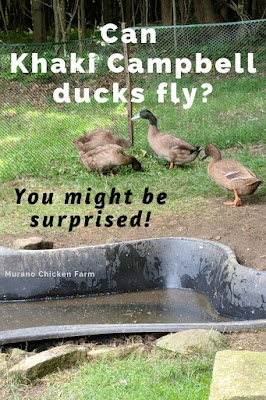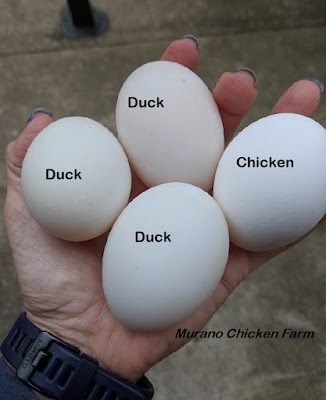Cheap seeds for growing feed plants
I picked up several packets when I was there. The flowers are just mainly to replace some that the flock have dug up. The pumpkins, tomatoes, squash, lettuce and cucumbers are for feed plants. The herbs and marigolds are to use for the chickens.
Related reading: How to hack a chicken egg, learn how to use marigolds to make your chickens lay eggs with orange yolks!
Can dogs and Chickens get along?
Many chicken keepers also have dogs. Those dogs can have various roles from family pet to chicken protector and raccoon chaser. Not all dogs are great companions for chickens though! Training and the dogs natural prey drive need to be taken into consideration when deciding to raise chickens and dogs together.
Having pets and poultry together can be a delicate balance. Many times our pets want much more to do with the livestock then we care to let them. Take Ashley for example. She's interested in the chicks from their very first peep. She's their biggest hatching fan, eagerly watching as they make their way into the world.
(poor Ashley can't watch now that we have cabinet incubators, though she tries!)Then it goes downhill quickly...
Should dogs be trusted around poultry?
After hatch she's a naughty little pup trying to catch them. We're not real sure what she would do when she catches one though, since she's never been allowed! The funny thing about her is that while she has a fascination with the peeping eggs, and really wants to play with the chicks.....she could care less about them once they get to be about a month old.
I guess they get too big for her. She has been pecked by a rooster when she got too close to his girls though, so maybe that has something to do with it. Or maybe being a rat terrier they have been bred to chase small things?French Black Copper Marans eggs
Every year I choose a breeder for new stock to add to the flock. I always consider egg color in this choice. My goal is to have a flock with the darkest possible egg color while still maintaining breed standards. We've been getting better every year. (you can see 2011's eggs on this post) I always think there is room for improvement, but I just love the picture this year! What do you think?
~L
The Guinea Wattle Myth
I've heard several theories on how to tell them apart. The females tail makes a 'hump', the males have a smooth tail area. The girls have fluffier skirts so they can brood keets. The boys have pointed feathers, the girls have rounded feathers. Etc etc.
Do wattles tell which sex a guinea fowl is?
The only theory that I've heard that even comes close to being accurate is the one about their wattles. Both male and female guineas have rather prominent wattles. This theory says that the females have small wattles that point backwards, like the white female guinea in the top picture.
The males are said to have larger wattles that fold over and point down, like the male pied guinea in the center. Obviously, this sometimes holds true. There seems to be a good amount of guinea fowl that look like the lavender guinea in the third picture though. As you can see, one wattle is small and points backwards, the other is larger and folds over and points down.
I think I'm funny...Craigslist ad
Here's the text:
I have an ankle biter for sale. It's a 5 month old calico silkie chicken. Probably a boy. Cute as can be, but has an issue with biting my ankles every morning when I open the pen. He has a twin....not sure if that one is a boy or a girl, but it doesn't like biting ankles at all.
I'm a very honest person...so when it comes to disclosing an issue, I'm all for it. In this case, this little brat has bit my leg every single day for about 2 weeks. Every morning. Only mornings.
I can go into the grow out pen at other times of the day and he just ignores me. It's just when I let them out in the morning. He makes a beeline for my ankles and starts biting! Bad little chicken!
These aren't chickens that I had intended to keep. The grow out pen is used for chicks that I want to see grow out before I sell them. Like these 2 calico's. I wasn't sure how their markings were going to turn out, or how 'typey' they were going to be.
Occasionally there are extra chicks in the grow out pen that haven't sold yet, but have moved beyond heat lamp stage. Or culls from the flock that have been moved to 'sell' status. I keep my flocks in top shape because I use them to Make $1000 every month from selling chicks, so sometimes I pull flock members out and they end up in the grow out pen for awhile.
There are 8 in there right now. A trio of blacks, the 2 calico's and 3 more blacks that I think are girls (took the boys to auction in January) I probably took a bunch of girls to auction too, I just couldn't tell them apart!
Oh boy, that was an event! *rolls eyes* Anyway, we'll see if anyone wants the little ankle biter....he doesn't actually bite that hard. lol
~L
UPDATE!!!! The ankle biter has sold! lol I got a message from the craigslist ad and a lady came and bought the twins and 2 other Silkies! Bonus!
Want information on raising chickens sent right to your email weekly? Click right here to join my list and get new posts sent directly to you the day they're published. You'll also get the free download 25 Ways to save money raising chickens.
No more ducks
Fox problem aside, all our waterfowl have had a fondness for the back door. They sit on the patio and wait by the door for us to come out. They know I'm a sucker for their cute faces and always give them snacks! Unfortunately ducks poop where they sit, so every time we walk outside we have to dodge giant piles of ducky poo. I think my husband was ready to move out and leave me to the ducks! Lol We use that door a lot so it was a constant problem.
Bathing a chicken (it's really easy!)
Do all chickens need bathed?
Generally chickens keep themselves clean by taking dust baths. The roll around and fluff the dust bath mixture under their feathers and do a whole body shake to get it down to the skin where it helps whisk away dirt oil and bugs. Occasionally, dust bathing is just not enough.
Whether you're bathing a chicken for show, or a hen had the unfortunate luck of walking under a roost while another chicken was pooping...here are my super-simple instructions on bathing a chicken.
What you need: A plastic tub or bucket. (dollar tree)
A plastic cup. (save your big gulp cups)
Baby shampoo. (dollar store, generic)
Hair dryer and old toothbrush.
How to bathe a chicken
You don't have to use a plastic tub or bucket, you can also use a bathroom sink or other small sink. I prefer to use a big bucket so I can bathe the chicken outside. Bathing a chicken is sort of like bathing a dog, even if they behave you'll still end up with water and soap in places it shouldn't be! lol Better to be safe than sorry and handle this whole process outside.
Khaki Campbell ducks can fly! (really well!)
Now I've dodged flying ducks enough to know what's happening above my head, but I understand where some confusion may come in. After all, many people are familiar with the Pekin duck. If you're not...it's that big, fat, white "Donald duck" looking guy. Except they usually don't wear hats and shirts, but I digress.
Khaki campbells are lighter than you think
Those ducks are a cross breed created for a large sized meat bird. Meat birds seldom get off the ground! They just have too much weight to them. They cannot fly. Just because those ducks cannot fly however, does not mean that other ducks cannot fly. Khaki Campbell ducks are less like a Pekin and more like a Mallard.
In fact, khakis are technically part mallard (going way back) so it makes sense that they would be a lighter more compact duck. Khaki's however, are a much lighter multipurpose breed and while they can be used for meat, they do make for a smaller dinner then the Pekin. They only get to be about 3-5 lbs full grown as opposed to the 9-10 lb meat duck.
The Khaki Campbell breed
The Khaki Campbell breed was developed in England at the turn of the 20th century. They are a cross breed between Rouen, Mallard and Runner ducks though the exact breeding was never revealed.
On average, the hens lay 300 eggs per year. Khaki Campbells can lay at this rate for around 5 years. Their eggs are equivalent to a large chicken's egg and are white but seem sort of opaque. They are smoother than a chicken egg (more like marble) without the slightly rough texture.
Khaki Campbell ducks are pretty much all brown, from their feet to their heads. The female has slight color variations in her body feathers and the males head is markedly darker then his body. They're definitely not the fanciest duck breed to own! They do make up for it in their friendly disposition though. This is one of the reasons I decided to raise them. Their just such sweethearts and make excellent pets!

.jpg)









